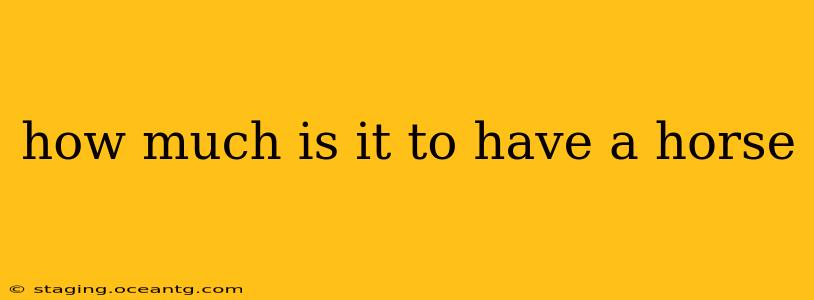How Much Does it Cost to Own a Horse? A Comprehensive Guide
The cost of owning a horse is a significant undertaking, far exceeding the initial purchase price. Many aspiring horse owners underestimate the ongoing expenses involved in providing proper care, leading to financial strain and, unfortunately, sometimes compromised animal welfare. This comprehensive guide will break down the various costs associated with horse ownership, helping you make an informed decision.
What is the initial cost of buying a horse?
The purchase price of a horse varies dramatically depending on breed, age, training, and bloodlines. You can find less expensive horses, especially older ones or those requiring retraining, for a few thousand dollars. However, highly trained competition horses or those with exceptional pedigrees can easily cost tens or even hundreds of thousands of dollars. Consider the horse's suitability for your riding experience and skill level. An unsuitable horse can lead to additional costs through veterinary care or retraining.
How much does it cost to board a horse?
Boarding fees represent a substantial recurring expense. Costs vary greatly depending on location (rural areas tend to be cheaper), the level of care provided (full board, pasture board, etc.), and the amenities offered (e.g., indoor arena, riding trails). Expect to pay anywhere from a few hundred to over a thousand dollars per month. Full board generally includes stall or paddock, feeding, daily care, and access to facilities. Pasture board is a less expensive option with limited amenities.
What are the veterinary costs for a horse?
Veterinary care is a crucial and often unpredictable expense. Routine care, including vaccinations and dental work, can amount to several hundred dollars annually. Unexpected illnesses or injuries can quickly lead to thousands of dollars in vet bills, especially if surgery is required. Equine insurance can help mitigate some of this risk but is an additional cost itself.
What other regular expenses should I anticipate?
Beyond the basics, several other costs contribute to the overall expense of horse ownership:
- Farrier: Regular hoof trimming and shoeing is essential for a horse's health and soundness. Expect to pay several hundred dollars every six to eight weeks.
- Feed: The quality and quantity of feed needed will vary based on the horse's size, workload, and nutritional needs. High-quality feed can be a significant expense.
- Tack and Equipment: Saddles, bridles, halters, and other equipment are essential, and will incur initial costs and further replacement/repair costs over time.
- Transportation: Trailering your horse to shows, lessons, or the veterinarian will add to expenses.
- Supplements: Some horses require supplements for optimal health and performance, adding further cost.
- Miscellaneous: This covers smaller expenses like grooming supplies, fly spray, and other necessities.
How can I reduce the cost of owning a horse?
Several strategies can help manage the cost of horse ownership:
- Choose a less expensive horse: Opting for an older, less-expensive horse can reduce the initial purchase price.
- Consider pasture board: This option significantly reduces boarding costs compared to full board.
- Learn basic horse care: This can enable you to perform some tasks yourself, reducing the need for paid services.
- Shop around for services: Compare prices for boarding, farrier, and veterinary services to find the best value.
- Budget carefully: Create a detailed budget that accounts for all potential expenses to avoid surprises.
What is the average annual cost of owning a horse?
It's impossible to give a precise figure, as costs vary enormously depending on the factors outlined above. However, a reasonable estimate for the average annual cost of owning a horse in the United States ranges from $5,000 to $15,000 or more, depending on the horse and level of care. Be prepared for unexpected expenses, and always keep a financial reserve for emergencies. Thorough planning and a realistic assessment of your financial capabilities are essential before taking on the responsibility of horse ownership.
